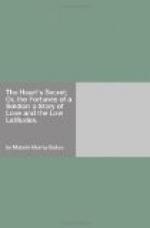“No, it would be impossible for me, on the very brink of the grave, to say aught but the truth; and I love you too deeply, too fervently, to be impertinent. You do not know me, lady. In my heart I have reared an altar to worship at, and that shrine for three years has been thy dearly loved form. How dearly and passionately I have loved-what a chastening influence it has produced upon my life, my comrades, who know not yet the cause, could tell you. To-morrow I must die. While I hoped one day to win your love, life was most dear to me, and I was happy. I could then have clung to life with as much tenacity as any one. But, lady, I find that I have been mistaken; my whole dream of fancy, of love, is gone, and life is no better to me than a burden. I speak not in haste, nor in passion. You must bear me witness that I am calm and collected; and I assure you that the bullets which end my existence will be but swift-winged messengers of peace to my already broken heart!”
“Captain Bezan,” said Isabella, hesitating, and hardly speaking distinctly.
“Well, lady?”
“How could you have so deceived yourself? How could you possibly suppose that one in your sphere of life could hope to be united to one in mine?” asked Isabella Gonzales, with a half averted face and a trembling voice, as she spoke. “It was foolhardy, sir; it was more than that; it was preposterous!”
“Lady, you are severe.”
“I speak but truth, Captain Bezan, and your own good sense will sustain it.”
“I forgot your birth and rank, your wealth-everything. I acknowledge this, in the love I bore you; and, lady, I still feel, that had not my career been thus summarily checked, I might yet have won your love. Nay, lady, do not frown; true love never despairs-never is disheartened—never relinquishes the object that it loves, while there is one ray of light yet left to guide it on. It did seem to me now, when we are parting so surely forever, that it might have been, on your part, more kindly, and that you would, by a smile, or even a tear-drop, for my sake, have thus blessed me, and lightened my heavy steps to the field of execution and of trial.”
Isabella Gonzales, as she listened to his words, could no longer suppress her feelings, but covering her face with her hands, she wept for a moment like a child. Pride was of no avail; the heart had asserted its supremacy, and would not be controlled.
“You take advantage of my woman’s heart, sir,” she said, at last. “I cannot bear the idea that any one should suffer, and more particularly one who has endeared himself to me and mine by such important service as you have done. Do not think that tears argue aught for the wild tale you have uttered, sir. I would not have you deceive yourself so much; but I am a woman, and cannot view violence or grief unmoved!”
“Say, rather, lady,” added the soldier, most earnestly, “that you are pure, beautiful, and good at heart, but that pride, that only alloy of thy most lovely character, chokes its growth in your bosom.”




